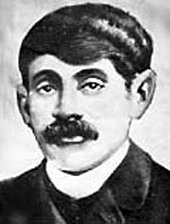Qasim Amin
Qasim Amin born on 1st December 1863 in Alexandria was an Egyptian jurist and one of the founders of the Egyptian national movement and Cairo University.

Early life
Born to an aristocrat Ottoman Kurdish father from Sulaimaniyah [1] who had served as an governor in Kurdistan and then in Egypt, Qasim's father had been exiled by the ottoman sultan Abdülmecid I from his native Kurdistan, Qasim's father settled in Egypt and became the commander of Khedive Isma'il Pasha's army, Qasim's father held a large estate in Alexandria [2]. Qasim's mother was the daughter of Ahmad Bey Khattab an egyptian member of Muhammad Ali Pasha's family[3].
Education
- University of Montpellier 1881-1885[4]
- Khedivial Law School[5]
- Cairo preparatory school[6]
- Alexandria palace school[7]
Posts
- Chancellor of the Cairo National Court of Appeals[8]
- Secretary general of Cairo university
Qasim was appointed the first secretary general of Cairo university[9]
Charis Waddy an Islamic scholar and writer, and the first woman graduate of Oriental Languages at Oxford University states that Qasim was 'a brilliant young lawyer'[10].
Works
Amin is perhaps most noted as an early advocate of women's rights in Egyptian society. His 1899 book The Liberation of Women (Tahrir al mara’a) and its 1900 sequel The New Woman (al mara’a al jadida) examined the question of why Egypt had fallen under European power, despite centuries of Egyptian learning and civilisation, and concluded that the explanation was the low social and educational standing of Egyptian women.
Amin pointed out the plight of aristocratic Egyptian women who could be kept as a "prisoner in her own house and worse off than a slave".[11] He made this criticism from a basis of Islamic scholarship and said that women should develop intellectually in order to be competent to bring up the nation's children. This would happen only if they were freed from the seclusion (purdah) which was forced upon them by "the man's decision to imprison his wife" and given the chance to become educated.[12]
Some contemporary feminist scholars, notably Leila Ahmed, have challenged his status as the supposed "father of Egyptian feminism". Ahmed points out that in the gender-segregated society of the time, Amin could have had very little contact with Egyptian women other than immediate family, servants, and possibly prostitutes. His portrait of Egyptian women as backward, ignorant, and lagging behind their European "sisters" was therefore based on very limited evidence.[13]
Books by Qasim Amin
- The Liberation of Women
- The New Woman
See also
References
- ^ Doria Shafik, Egyptian feminist: a woman apart, Cynthia Nelson
- ^ Amin, Qasim. The Liberation of Women: Two Documents in the History of Egyptian feminism. Tr. Samiha Sidhom Peterson. Cairo: American University in Cairo Press, 2000, p. xi.
- ^ Gendered nations, nationalisms and gender order in the long nineteenth century, Ida Blom, Karen Hagemann, Catherine Hall
- ^ The liberation of women and The new woman, two documents in history, Qasim Amīn
- ^ The liberation of women and The new woman, two documents in history, Qasim Amīn
- ^ The liberation of women and The new woman, two documents in history, Qasim Amīn
- ^ The liberation of women and The new woman, two documents in history, Qasim Amīn
- ^ Biographical dictionary of modern Egypt, Arthur Goldschmidt
- ^ The Egyptian upper class between revolutions, 1919-1952, Magda Baraka, St. Antony's College (University of Oxford). Middle East Centre
- ^ Women in Muslim history, Charis Waddy
- ^ Qasim Amin by Ted Thornton, from History of the Middle East Database, retrieved 29 December 2004.
- ^ A Century After Qasim Amin: Fictive Kinship and Historical Uses of “Tahrir al-Mara '”, Malek Abisaab and Rula Jurdi Abisaab, Al Jadid, Vol. 6, no. 32 (Summer 2000), retrieved 29 December 2004.
- ^ Ahmed (1992). Women and Gender in Islam: Historical Roots of a Modern Debate. New Haven: Yale University Press. ISBN 0-300-05583-8.
